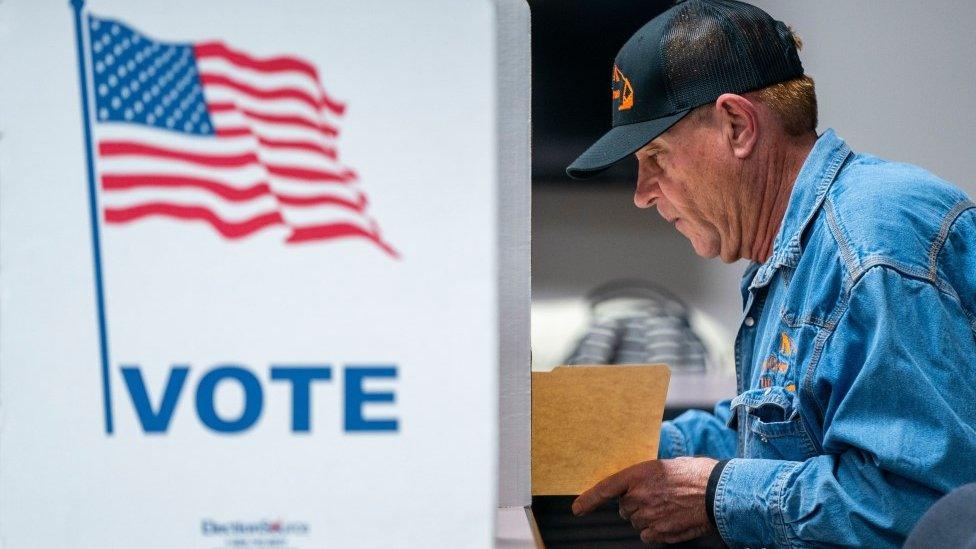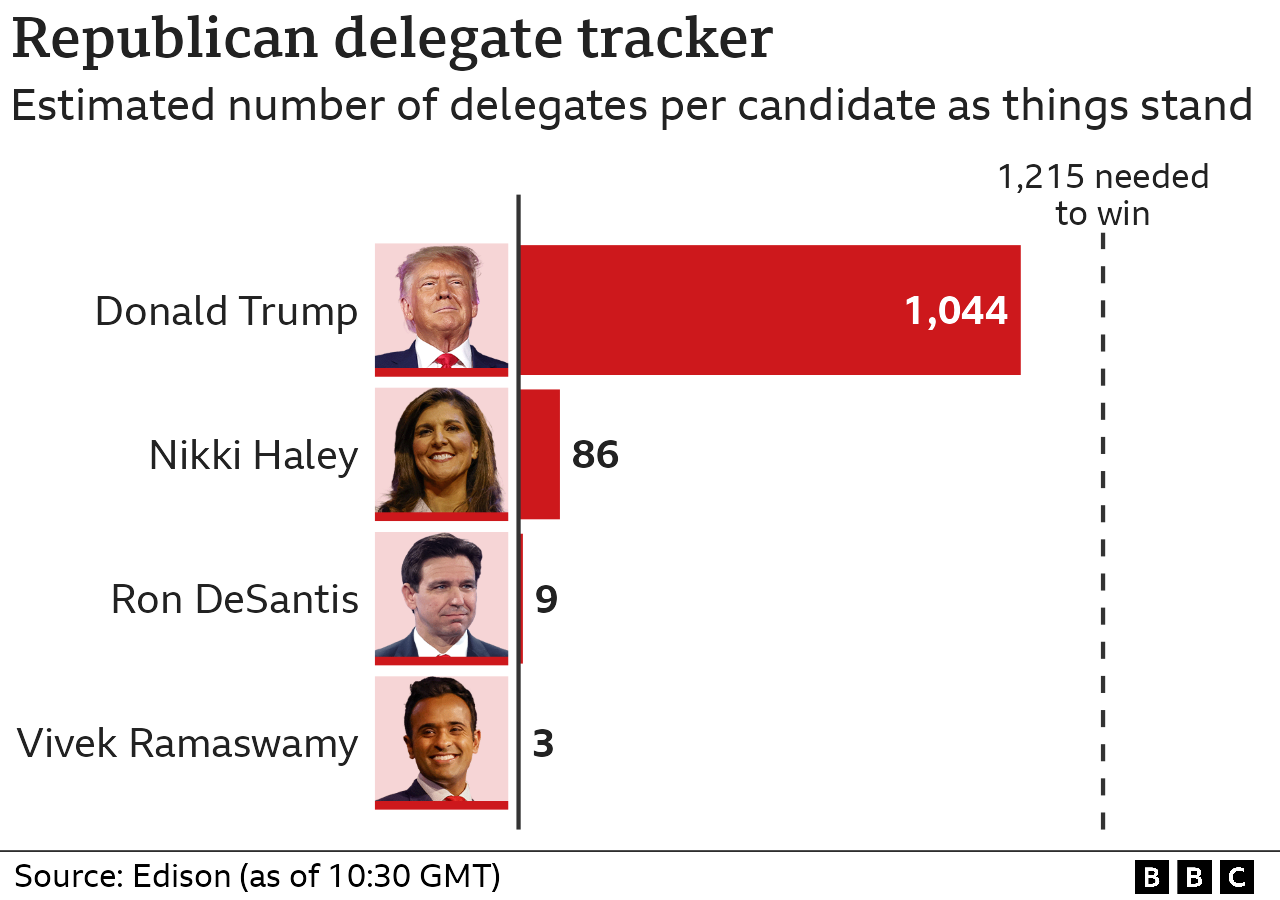Key takeaways from Super Tuesday results
- Published

Super Tuesday wasn't as super this year due to a slew of predictable results, but there were a few surprises and some warning signs for Donald Trump and Joe Biden ahead of their expected rematch in November.
Here are some of the key takeaways after millions of voters in 15 states and American Samoa chose their preferred party candidates for president.
Full steam ahead for Trump
He posted a dominant performance, with wins in states across the country. "They call it Super Tuesday for a reason," Mr Trump told supporters in Florida. "This is a big one."
Some of the victories were staggering in their size: a 70% margin in Alabama, 61% in Texas, some 70% of the vote in California.
The former president will walk away with a near-insurmountable lead in convention delegates, even if he will have to wait until next week to mathematically lock the Republican nomination.
And with Nikki Haley formally announcing on Wednesday that she will be dropping out of the race, Mr Trump's nomination is just about certain.
Exit polls give some indication of why the former president won so big.
In North Carolina, 43% of Republican primary voters said immigration was the most important issue for them - a topic that has been at the top of Mr Trump's political agenda since he launched his first presidential bid in 2015. In Virginia, 64% said that they trusted Mr Trump over Nikki Haley on border security.
Those Virginia primary voters also said they wanted a candidate who shares their values and fights for people like them- qualities that tilt toward Trump - over temperament and electability.
Electability was one of Ms Haley's central pitches to voters. It apparently fell flat.
But there were some alarm bells
Despite the big win, there were indications of continued disaffection with Mr Trump among some Republican primary voters.
In Virginia and North Carolina, Ms Haley continued to do well in counties with large numbers of young, suburban and college-educated voters - and some of their concerns registered in exit polls.
Forty percent of Republican primary voters in Virginia and 32% in North Carolina said that Mr Trump - who faces four criminal cases - would not be fit to be president if convicted of a crime.
Among North Carolina Haley voters, only 21% said they would vote for the Republican nominee "no matter who it is".
Late on Tuesday night, the Haley campaign pointed to such results and issued a warning. "Today, in state after state, there remains a large bloc of Republican primary voters who are expressing deep concerns about Donald Trump," a spokeswoman said.
Of course, opinions could change in the heat of the autumn general election campaign. Back in 2016, exit polls found that 75% of non-Trump voters in the Republican primary said they would be dissatisfied with Mr Trump as the eventual nominee.
But in the end, 90% of Republicans backed him against Hillary Clinton in the election.
Nikki Haley's Vermont surprise not enough to keep her in race
The former South Carolina governor chose not to hold a public event on the evening of Super Tuesday, perhaps reflecting the campaign's belief that there would be little to celebrate from the day's results.
She could have held a victory party in Vermont where she pulled out a narrow win, her second victory of the primary season.
She campaigned in Burlington on Sunday alongside the state's popular Republican governor, Phil Scott, who said Republicans, independents and Democrats should join together to stop Mr Trump.
In Vermont it worked. In all the other Super Tuesday contests, however, there simply weren't enough anti-Trump voters - even in states like Virginia that allow non-Republicans to vote in the party primary - to translate into wins or even narrow defeats.
Weeks ago, Ms Haley pledged to stay in the race until Super Tuesday, hoping to add to her delegate total. But that was the end of the road.
On Wednesday morning, she held a press conference where she announced that she will be bowing out of the race.
She called on Mr Trump "to earn the votes of those in our party and beyond it who did not support him", though she did not endorse him.
She did not indicate what her future plans might be, but said she looks forward to being a "private citizen".
Earlier this week, she said she did not feel committed, despite an earlier pledge, to support Mr Trump if he is the party's nominee.
Will she ultimately back the former president, despite her recent sharp criticisms? Is she angling for an independent presidential bid? With all the drama now stripped out of the nominating contests, the South Carolinian's future is one of the few immediate sources of mystery.

More on the US election
Explained: A simple guide to the US 2024 election
Analysis: Where Biden v Trump will be won and lost
Policies: What a Trump second term would look like
Recap: The Trump life story to date

Biden struggles to shake Gaza protest vote
In the Michigan primary last week, more than 100,000 voters - 12% of the total - turned out to cast ballots for "uncommitted" instead of the incumbent president, as part of an organised Gaza war protest.
That phenomenon reared its head again on Tuesday. In Minnesota, "uncommitted" garnered approximately 20% of the vote and topped that mark in the counties around Minneapolis, the state's largest city.
In North Carolina, one of the few true general election battleground states on the Super Tuesday schedule, 12% of voters opted for "no preference".
"Tonight's numbers showed that President Biden cannot earn back our votes with just rhetoric," said Vote Uncommitted MN spokesperson Asma Nizami. "Over 35,000 Minnesotans made it clear that Democrats want Joe Biden to change his policies."
Pro-Palestinian groups are already targeting next week's primary in Washington state, which has a sizeable left-wing activist population. If the Biden campaign was hoping that Michigan, with its large population of Arab-Americans, was the beginning and end of the anti-Biden protest vote, Tuesday will have been a rude awakening.



Anthony Zurcher offers his weekly take on the world of American politics:
If you're in the UK, sign up here.
And if you're anywhere else, sign up here., external
